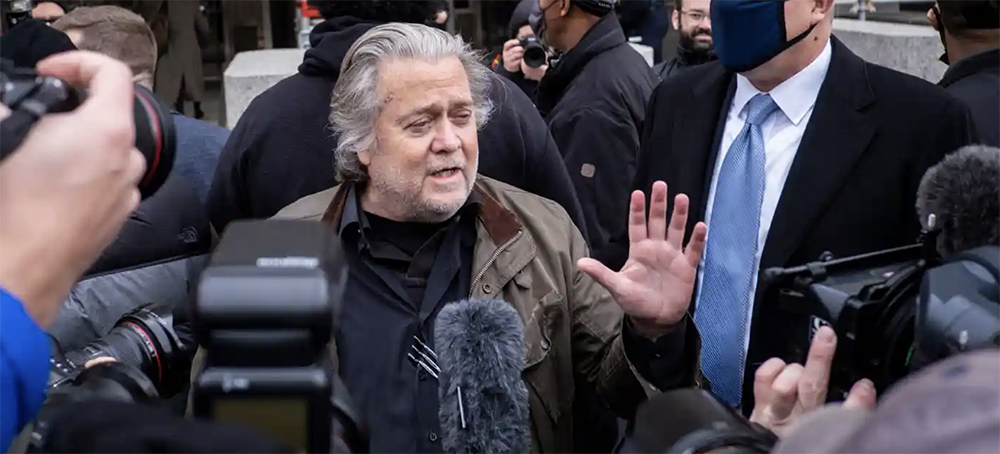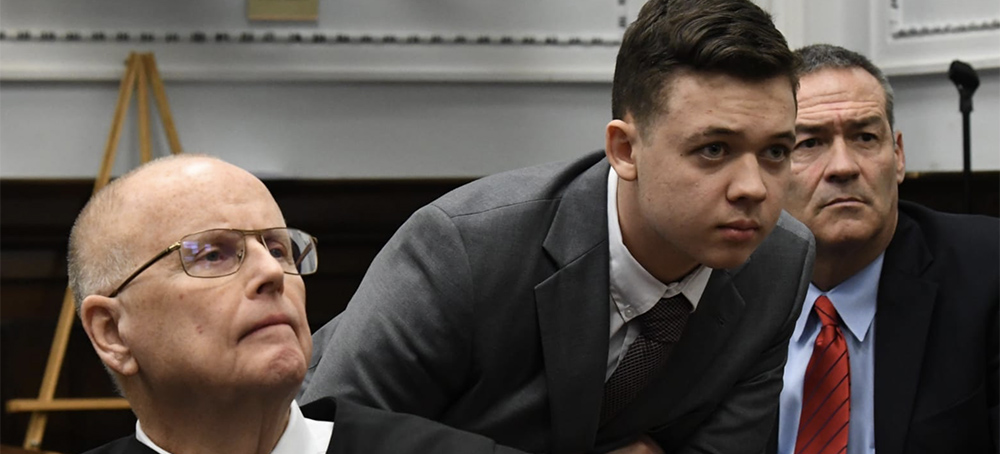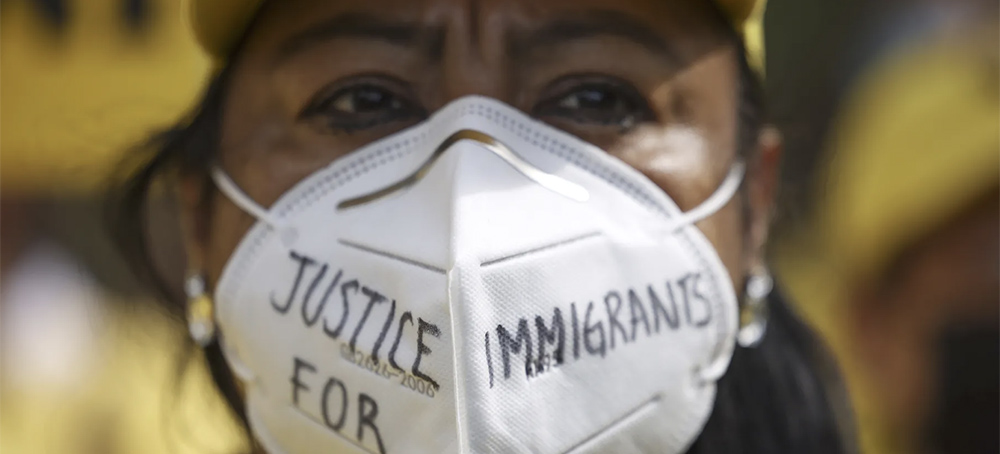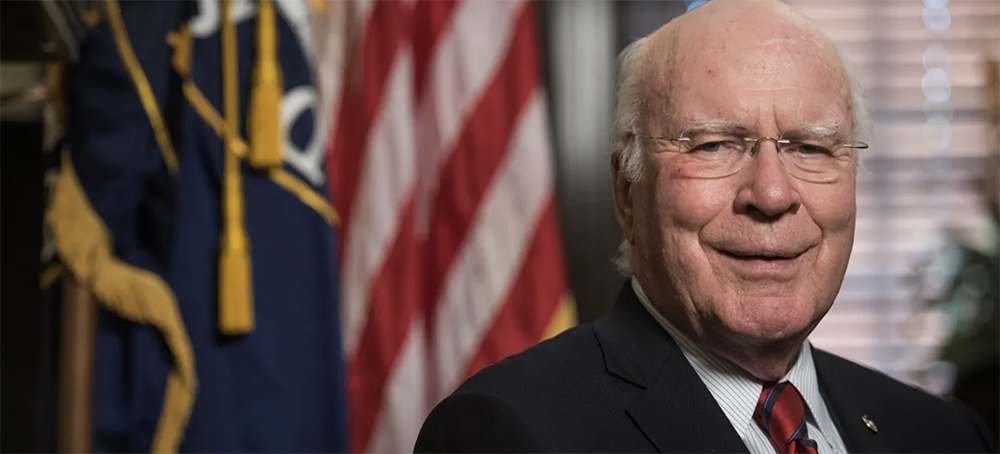Live on the homepage now!
Reader Supported News
A Vermont state representative is contemplating a challenge to Peter Welch for Leahy’s Senate seat, but only if Sanders steps back.
Welch, a Democrat, is known to be planning a run to replace Leahy if and when he retires. If Sanders endorses Welch, he functionally forecloses any challenge from the left. State Rep. Tanya Vyhovsky is also contemplating a run for Senate if Leahy steps down but told The Intercept she won’t do so if Sanders gets behind Welch. “I don’t want to lose any capacity I have [in the state legislature] in a race that’s unwinnable,” she said. “That is a big piece of this — if Bernie is going to endorse Peter there’s not much point doing it.”
Vyhovsky broadly shares Sanders’s politics and was endorsed by him the previous two cycles. Meanwhile, Welch and Sanders are much closer personally than they are politically. If Sanders does freeze the field by endorsing Welch, it would come out of personal loyalty rather than as a way to advance his political revolution. His penchant for such loyalty was on display during the presidential campaign, when he repeatedly resisted efforts by advisers to get him to go on the attack against Joe Biden. “Joe is a friend,” he would often say.
Leahy remains popular in Vermont as well. Asked by The Intercept if he planned to endorse a candidate or allow a race to play out, Leahy said recently that he wasn’t ready to make a public statement either way. Sanders, historically, has taken large amounts of time to make endorsements; Vermont political observers and those around Sanders are unsure if he’ll endorse Welch. (A Sanders spokesperson declined to comment.)
Welch was caught up in a scandal recently when the Washington Post and “60 Minutes” revealed he was one of three Democrats who’d pushed for a law that tied the Drug Enforcement Administration’s hands when it came to going after pill mills fueling the opioid epidemic, which was — and still is — raging in Vermont.
It later emerged Welch was trading stocks in companies involved with the legislation, including buying hundreds of thousands’ worth of Rite Aid stock as the company lobbied for the law.
While the state is a safe vote for Democrats in presidential elections, Vermont’s Republican Gov. Phil Scott is widely popular and cruised to reelection in 2020, smashing the Democrat by 41 percentage points. He’s up for reelection in 2022 — the state’s governor serves two-year terms — and has previously said he’s not interested in running for Senate, though national Republicans will no doubt pressure him otherwise.
Republicans were dealt a blow last week when neighboring Republican New Hampshire Gov. Chris Sununu declined a run for the Senate, citing the chamber’s hopelessly partisan nature. Republicans have multiple other pickup opportunities, including in Georgia and Arizona, and are confident in their ability to seize the upper chamber.
When Leahy was first elected to the Senate in 1974 in the blue wave following Watergate, he was the first Democrat ever to win in the state. His run was made more difficult by a third-party candidate who gained real traction. A young Bernie Sanders was perennially the nominee of the Liberty Union Party and had already run multiple times for Senate and the governor’s office, never breaking double digits. Sanders ended up winning just over 4 percent and Leahy won his race by about 4,000 votes.
Sanders would soon retire from politics and devote himself to media. Of course, Sanders didn’t stay retired, becoming the mayor of Burlington, Vermont, in 1981 and then winning election to Congress as an independent in 1990. He and Leahy have had something of an alliance since, as Sanders has danced delicately in and out of the Democratic Party. In 2006, when the other Vermont Senate seat opened up, Sanders ran for it, won the Democratic primary, then rejected the party line and ran as an independent in the general election. The state party voted to unanimously endorse him anyway and didn’t field a Democrat. He’s remained an independent but caucuses with Democrats, and continues to run in Democratic primaries.
In 2006, Welch, then a state senator, ran for the House seat, took the Democratic primary uncontested, and went on to win the general election fairly easily. Welch and Sanders have been strong allies since, even though Sanders is well to Welch’s left. In 2016, Welch endorsed Sanders for president — sparking jokes in Vermont that Welch was hoping to help open up his future Senate seat — while Leahy backed Hillary Clinton.
Vyhovsky was raised working class in Essex Junction, Vermont, in a single-parent home, and serves as a social worker alongside her statehouse service, which only began in 2020 when she successfully ousted a Republican representative. Vyhovsky said that Welch is well liked personally in the small state and widely considered to be a “good guy.”
“That’s fine, go have a beer with him, but he doesn’t have to be your representative,” she said. “Peter is fine, I guess, but people are desperate for change, they’re desperate for broader representation and new voices and different voices.”
 Trump ally Steve Bannon surrenders to authorities. (photo: Pete Marovich/EPA)
Trump ally Steve Bannon surrenders to authorities. (photo: Pete Marovich/EPA)
Trump ally, indicted after defying subpoena from House panel, urges supporters to ‘stay focused, stay on message’
Bannon was surrounded by photographers and a protester holding a sign that said “Coup plotter” as he stepped out of a black vehicle at around 9.30am.
“I don’t want anybody to take their eye off the ball,” he said, the Axios website reported. “We’re taking down the Biden regime every day. I want you guys to stay focused, stay on message. Remember, signal not noise. This is all noise, not signal.”
The 67-year-old was taken into custody, expected to appear in district court in the afternoon.
The former White House chief strategist was indicted on Friday after defying a subpoena from a House committee investigating the deadly attack on the US Capitol on 6 January by Trump supporters seeking to overturn the election.
Bannon faces two counts of criminal contempt: one for refusing to appear for a congressional deposition and the other for refusing to provide documents in response to the committee’s subpoena.
Each count carries between 30 days and a year in jail. The indictment is the first for criminal contempt of Congress in nearly four decades.
Bannon, a former executive chairman of Breitbart News, pushed false conspiracy theories about the 2020 election.
On 5 January he prophesied on his podcast: “All hell is going to break loose tomorrow.”
That evening he was part of a gathering of Trump allies at the Willard hotel in Washington that the House of Representatives committee has called the “war room”.
Bannon refused to cooperate with the committee by citing an assertion of executive privilege by Trump. Legal experts argue that this has little standing given that Bannon was a private citizen at the time of the insurrection. Last month the House voted 229-202 to hold him in contempt.
A second expected witness, the former White House chief of staff Mark Meadows, defied his own subpoena from the committee on Friday. Trump has also intensified his legal battles to withhold documents and testimony about the insurrection.
 Kyle Rittenhouse. (photo: Mark Hertzberg/Getty Images)
Kyle Rittenhouse. (photo: Mark Hertzberg/Getty Images)
Kyle Rittenhouse now only faces five criminal charges in relation to the Aug. 2020 shooting that killed two people and injured a third.
Rittenhouse, 18, has faced a slew of charges, including first-degree reckless homicide, in relation to the Aug. 25, 2020 shooting amid unrest in Kenosha, Wisconsin, over the police shooting of Jacob Blake. During two incidents caught on camera, Rittenhouse fired an AR-15 and killed 36-year-old Joseph Rosenbaum and 26-year-old Anthony Huber. He also severely wounded Gaige Grosskreutz, now 27.
But just before jurors were expected to hear closing arguments in the murder trial, Kenosha Judge Bruce Schroeder accepted a defense motion to dismiss the charge of possession of a dangerous weapon by a person under 18—the only misdemeanor the teenager was facing. The Rittenhouse defense team has argued to dismiss misdemeanor charges—punishable by up to nine months behind bars—throughout the trial.
In accepting their argument, Schroeder—who has come under withering scrutiny centering on accusations of favoring the defendant—explained the dismissal came because Wisconsin law was poorly written and that the longer barrel size of the firearm Rittenhouse carried that night meant he did not violate the statute.
The prosecution conceded that Rittenhouse’s rifle was not short-barreled, as the law prohibits, leaving Rittenhouse facing five felony charges. They are first-degree reckless homicide, two counts of first-degree recklessly endangering safety, first-degree intentional homicide, and attempted first-degree intentional homicide.
Former federal prosecutor Neama Rahman told The Daily Beast he was not surprised by the last-minute decision to dismiss the gun charge, noting that the statute was “poorly worded” and that the judge “said he was still researching the law last week.”
“The prosecution was overcharging and not putting evidence in,” Rahman said, noting that Schroeder has also been ruling throughout the trial in favor of the defense.
Indeed, this is the second time Schroeder has accepted a defense motion to dismiss charges against Rittenhouse. Last week, Schroeder dismissed a violating curfew charge—a misdemeanor that the judge ruled the prosecution did not present enough evidence for.
A Rittenhouse attorney also noted on Monday that the defense officially filed a motion for a mistrial with prejudice, a move that would disallow prosecutors from re-trying the case and was brought up in court last week. Schroeder said he would rule on the matter “later,” before bringing in the jury to begin instructing them on the law as to whether Rittenhouse was acting lawfully in self-defense at the time of the incident.
For Paul Bucher, a former district attorney in Waukesha County, Wisconsin, and a one-time state attorney general candidate, the prosecutorial losses were “not surprising because this case was overcharged.”
“The government lost sight of what they could prove in this case, and now the judge is mending it by dismissing charges,” Bucher said. “During the trial, the government also did not spend enough time proving Rittenhouse’s mindset when he pulled the trigger.”
On Friday, however, Schroeder instructed the jury to consider two lesser charges in relation to Huber’s shooting, which previously produced the most serious charge: first-degree intentional homicide. The judge denied the prosecution’s request for the option of a lesser charge in Rosenbaum’s death.
Schroeder also instructed the jury on Monday to consider two lesser charges—attempted second-degree intentional homicide and first-degree recklessly endangering safety—for the pre-existing attempted first-degree intentional homicide charge related to the shooting of Grosskreutz. During the trial, Grosskreutz testified that the gunshot wound he sustained from Rittenhouse “vaporized” his bicep.
“Now, it seems the prosecution’s saving grace could be the lesser charges that the judge approved of,” Bucher said.
According to the ex-prosecutor, lesser charges are a last-minute way for the prosecution to secure a conviction. In this case, Bucher added, the prosecution asking for a slew of lesser charges proves “they are aware they didn’t argue an iron-clad case.”
 Danny Fenster and Bill Richardson on the tarmac in Naypyidaw, Myanmar, on Monday. (photo: The Richardson Center/NYT)
Danny Fenster and Bill Richardson on the tarmac in Naypyidaw, Myanmar, on Monday. (photo: The Richardson Center/NYT)
Fenster, 37, the managing editor of independent online magazine Frontier Myanmar, looked frail on arrival at Hamad International Airport in Doha but said he had not been beaten while in captivity.
"I feel great and am really happy to be on my way home. I’m incredibly happy for everything Bill has done," he told reporters on the tarmac, referring to Richardson's intervention.
"You just go a little stir crazy and the longer it drags on the more worried you are that it’s just never going to end. That was the biggest concern, staying sane through that."
Asked if he had been mistreated, he said: "I was arrested and held in captivity for no reason, so I suppose so. But physically, I was healthy. I wasn’t starved or beaten."
Fenster was sentenced to 11 years in prison on Friday for incitement and violations of laws on immigration and unlawful assembly, a ruling that drew international condemnation.
He flew out of Myanmar with Richardson, who stood beside Fenster after they arrived in Doha.
"I think what made the difference (in negotiations to secure Fenster's release) was my efforts to work with the government of Myanmar on humanitarian assistance, on vaccines and that made the difference," Richardson said.
He thanked Qatar's government for supporting efforts to "secure the release of hostages, American and non-American."
Fenster was among dozens of media workers detained in Myanmar since a Feb. 1 coup that led to an outpouring of public anger over the military's abrupt end to a decade of tentative steps towards democracy.
Fenster said efforts to secure other journalists' release would continue.
"We’re going to keep the focus on them as much as possible and do everything we can to lobby on their behalf. We’re still trying really hard to get them out of there," he said.
CRACKDOWN
According to rights group Assistance Association for Political Prisoners, 10,143 people have been arrested since the coup and 1,260 people killed in violence in the country, most of them in a crackdown by security forces on protests and dissent.
The military has accused many media outlets of incitement and spreading false information.
Myanmar's military-owned Myawaddy TV late on Monday announced Fenster had been granted an amnesty after his conviction, saying it was due to requests from Richardson and also two Japanese representatives "to maintain the friendship between the countries and to emphasize humanitarian grounds".
U.S. Secretary of State Antony Blinken commended U.S. officials as well as Richardson for facilitating Fenster's release.
"We are glad that Danny will soon be reunited with his family as we continue to call for the release of others who remain unjustly imprisoned," he said in a statement.
A source familiar with Richardson’s trip said State Department officials at first objected to the initial visit to Myanmar, delaying the trip for two months, and advised Richardson not to raise the case with the junta.
The source said the trip to pick up Fenster was arranged without the knowledge of the State Department and the U.S. embassy in Yangon, who were only informed he would be released on Sunday night.
A State Department spokesperson did not immediately respond to a request for comment on Monday.
Before his release, some State Department officials expected Fenster to be pardoned and worried that Richardson raising the case could in fact delay his release by leading the junta to see the American as an asset to try to extract concessions.
 An immigration activist participates in a rally near the White House on October 7. The group demonstrated for immigration reform and urged a pathway to citizenship for undocumented immigrants. (photo: Kevin Dietsch/Getty Images)
An immigration activist participates in a rally near the White House on October 7. The group demonstrated for immigration reform and urged a pathway to citizenship for undocumented immigrants. (photo: Kevin Dietsch/Getty Images)
Immigration provisions in Democrats’ budget reconciliation bill are likely on the chopping block.
But like many of the immigration proposals from the last few decades, these new, critical immigration fixes appear unlikely to actually become law. So why is this latest round of immigration reform proposals probably doomed? Two reasons: because of the structure of the Senate and because, on immigration, identity issues have replaced policy.
The American public has never been more supportive of immigration, with a third saying that it should be increased. In 1986, the last time Congress passed a major immigration reform bill, only 7 percent of Americans supported increasing immigration levels. And narrower reforms, such as expanded protections for undocumented people already in the US, have been found to have majority support.
But despite that growth in public support, the House and Senate haven’t been able to reach bipartisan agreement on immigration in decades. Though comprehensive immigration reform bills passed one chamber in 2007 and 2013, they ultimately failed in the other. And while the House has passed bipartisan legislation addressing narrower immigration issues over the last couple of years, those bills have yet to gain traction in the Senate.
This has led to a Democratic insistence on trying to use the budget reconciliation process to address immigration, which would bypass the need for Republican support. So far, those efforts have failed. But Democrats haven’t given up on it yet.
As part of their social and climate spending package, known as the Build Back Better Act (BBB), Democrats initially sought to create a path to citizenship for millions of undocumented immigrants living in the US. That plan was rejected by the Senate parliamentarian Elizabeth MacDonough, who is tasked with determining what can and cannot be passed via budget reconciliation.
Reconciliation allows bills to pass the Senate with a simple majority — which Democrats have by one vote — but for a provision to be included in a reconciliation package, it must have a “more than incidental” impact on the budget. A pathway to citizenship, MacDonough said, would be a “tremendous and enduring policy change that dwarfs its budgetary impact.” Democrats then proposed giving people who entered the US illegally prior to 2010 a pathway to green cards. MacDonough also nixed this plan.
This has led to Democrats’ plan C. Under the latest draft of the bill, undocumented immigrants would be given temporary protection from deportation through what is called “parole” for a period of five years. Those who arrived in the US prior to 2011 — numbering an estimated 7 million — could apply for five-year, renewable employment authorization.
The bill would also recover millions of green cards that went unused in the years since 1992. Under current law, any allotted green cards not issued by the end of the year become unavailable for the following year. In 2021, the US failed to issue some 80,000 green cards due to processing delays, and those cards have now gone to waste.
The bill also allows some people who have been waiting to be issued a green card for at least two years to pay additional fees to bypass certain annual and per-country limitations and become permanent residents years, if not decades, sooner than they would have otherwise. And the bill preserves green cards for Diversity Visa winners from countries with low levels of immigration to the US who were prevented from entering the country on account of Trump-era travel bans and the pandemic.
Those provisions, though short of desperately needed structural reform to the immigration system, would provide long-awaited assurance for many undocumented immigrants who have put down roots in the US and more opportunities for legal immigration at a time when the country could use more foreign workers. The provisions are also broadly popular: A recent poll from Data for Progress found that 75 percent of voters, including a majority of Republicans, back them.
Nevertheless, they may be on the chopping block.
Democrats’ immigration proposal faces potential roadblocks in the Senate
In the House, Reps. Jesus “Chuy” Garcia, Adriano Espaillat, and Lou Correa have pushed for immigration reforms to be included in the reconciliation package. But even if they are ultimately successful, the provisions face two significant obstacles in the Senate: key moderates and the parliamentarian.
Moderate Sen. Kyrsten Sinema announced last week that she supported the current provisions, but there is no word yet from Sen. Joe Manchin, who has expressed skepticism about addressing immigration in the bill. As Senate Democrats need every vote in their caucus, should Manchin refuse to back the provisions, they’d be effectively dead.
MacDonough has also yet to weigh in on the latest plan. But given that she twice rejected Democrats’ previous immigration proposals, she may do so again. Explaining why she rejected Democrats’ path to citizenship proposal in September, MacDonough wrote that the impact of the legislation far outweighed its budgetary consequences, making it inappropriate to include in a reconciliation bill.
“It is by any standard a broad, new immigration policy,” she said. “The reasons that people risk their lives to come to this country — to escape religious and political persecution, famine, war, unspeakable violence, and lack of opportunity in their home countries — cannot be measured in federal dollars.”
She also asserted that, if she were to allow Democrats to pass the measure through reconciliation, that might be used as a precedent to justify revoking any immigrants’ legal status in future reconciliation bills.
Proponents of including immigration in reconciliation have asserted that MacDonough might take a different tack when it comes to plan C, in part because it doesn’t create any new, permanent legal protections that weren’t previously authorized by Congress. But her September opinion suggests that she opposes any use of reconciliation that has far-reaching consequences for immigrants.
“No one can be categorically sure about what she’s going to do. But there’s enough in her opinion to suggest that she will think this was too big a reach in reconciliation,” said Muzaffar Chishti, a senior fellow at the Migration Policy Institute, a nonpartisan think tank.
Despite calls to overrule — or even fire — the parliamentarian, Democrats have made it clear they plan to abide by her ruling. As Democratic Sen. Bob Menendez said in a September press call, “The parliamentarian is the final word of what is and not permitted under the rules.”
Congress hasn’t passed major immigration legislation in two decades
These barriers mean immigration reform seems to be proving elusive once again. Experts say that’s because immigration has shifted from a matter of policy to a matter of identity, and that as this shift was happening, the way Congress functions changed drastically.
Chishti said that the immigration debate previously used to be principally focused on ideas: “Is immigration good for the country or not? What kind of immigration is good for the country — high-skilled, low-skilled? Do we need more finance people or more nurses?”
And there used to be immigration proponents — and skeptics — in both parties. For instance, labor unions used to advocate for restrictionist immigration policies, though that shifted in the 2000s. Business-minded Republicans recognized the economic benefits of immigration. Now, the debate is more tied up in identity. It has also grown in electoral importance, with voters ranking it the third most important issue facing the country after the coronavirus and the economy in a Harvard CAPS-Harris poll earlier this year.
“Immigration is all about culture and race. It is about people’s perception of how immigration is changing our country,” Chishti said. “It’s much more emotional.”
What has also changed is Congress’s reliance on the filibuster. During the era in which the 1986 bill was passed, you could “count on one hand the number of times the filibuster was invoked,” Chishti said. Now, if a majority in the Senate doesn’t support legislation, it doesn’t even get considered.
That makes it hard, but perhaps not impossible, to build consensus around immigration.
Should their efforts to include immigration in the reconciliation bill fail, Democrats might not have another chance to pursue their policy priorities until after next year’s midterms — and that’s assuming they maintain control of both chambers of Congress, a scenario that’s very much in doubt. A Republican Congress may not be interested in immigration reform at all, especially if they intend to use immigration as an electoral weapon against the Biden administration and the Democratic party.
Regardless of who controls Congress in 2023, there might be room for compromise on narrower reforms to the legal immigration system that relate to the economy, according to Theresa Cardinal Brown, managing director of immigration and cross-border policy at the Bipartisan Policy Center.
A Bipartisan Policy Center-Morning Consult poll conducted in May found that, across the political spectrum, people were more likely to be willing to compromise on the issues of “providing visas for immigrants supporting the US economy where companies cannot find US workers” and “providing visas for immigrants investing in research and innovation for future growth of the US economy.”
While those issues don’t represent the top priorities of either party on immigration, addressing them might have important corollary impacts. Creating new legal pathways for foreign workers might mitigate unauthorized immigration at the southern border and also open opportunities for undocumented immigrants already living in the US to get legal status.
“If we legalize everybody in the country tomorrow, we still have the same system in place that made them become undocumented,” Cardinal Brown said. “What do we do with the next person? Unless we fix our legal immigration system, we’ll continue to be in that position.”
 Young citizen wears a T-Shirt of revolutionary hero Ernesto Guevara, Havana, Cuba, Nov. 14, 2021. (photo: Twitter/@Granma_Digital)
Young citizen wears a T-Shirt of revolutionary hero Ernesto Guevara, Havana, Cuba, Nov. 14, 2021. (photo: Twitter/@Granma_Digital)
The "Red Scarves" initiative emerged spontaneously through a group of college students on the Telegram social network
"These actions are part of the strategy of unconventional war against our people. We deserve to live in peace and without the obstacles imposed by unilateral coercive measures," President Miguel Diaz-Canel stated.
The initiative known as "Red Scarves" emerged spontaneously through a group of college students on the Telegram social network and gained followers throughout the weekend. Its activities included concerts, poetry readings, documentary screenings, book presentations, and speeches related to the country's future.
"We work for a more inclusive, democratic, participatory socialism, in which our people can raise even more their voices and make more decisions in favor of the country,” journalist student Pedro told local outlet Prensa Latina.
"We are not the owners of democracy. However, we will not reconcile with extremists who disguised as conciliators and support U.S.-backed destabilization attempts," he added and condemned that the first Twitter account of the "Red Scarves" sit-in was suspended.
Previously, Foreign Affairs Minister Bruno Rodriguez also denounced a gross manipulation in the Twitter algorithm to produce the impression that many Cuban Internet users published messages against the Revolution. Such messages included a label that summoned people to an unauthorized opposition march on Monday when authorities reopened the country’s borders to tourism.
"The United States tries to show Cuba as a failed state to justify its coercive policies against our people. However, the empire only gains contempt among the international community with this attitude,” Rodriguez concluded.
 A young climate activist joins tens of thousands of others in a protest march in Glasgow during the COP26 summit. (photo: Jonne Roriz/Bloomberg News)
A young climate activist joins tens of thousands of others in a protest march in Glasgow during the COP26 summit. (photo: Jonne Roriz/Bloomberg News)
The Glasgow Climate Pact secured a 2023 timeline for countries to resubmit their national emissions-reduction targets to be more aligned with 1.5°C (2.7°F) of warming, and made an unprecedented mention of fossil fuels and recognition of the need for Just Transition.
Agreement was also reached on carbon markets, with major loopholes closed but still susceptible to bad-faith actors. The U.S., EU, Australia, and other wealthy nations blocked the creation of a fund to compensate vulnerable nations for irreparable loss and damage caused by climate change, tabling it for more discussion next year at COP27, but the issue — long a priority for developing low-emitting nations, some literally disappearing beneath rising seas, least culpable for the climate crisis — got more attention at COP26 than at previous UN talks.
As reported by The Washington Post:
Two weeks of high-profile talks yielded a package that pushes countries to strengthen near-term climate targets and move away from fossil fuels faster. It insists that wealthy countries fulfill a broken promise to help vulnerable nations cope with the rising costs of climate change. And it cracks open the door to future payments developed nations might make for damage already done.
Saturday's agreement, however, does not achieve the most ambitious goal of the 2015 Paris accord — to limit Earth's warming to 1.5 degrees Celsius (2.7 Fahrenheit) above preindustrial levels. Instead, delegations left Glasgow with the Earth still on track to blow past that threshold, pushing toward a future of escalating weather crises and irreversible damage to the natural world.
And representatives from hard-hit nations feared that the deal still leaves their people facing an existential threat.
"The difference between 1.5 and 2 degrees is a death sentence for us," Aminath Shauna, the Maldives' minister of environment, climate change and technology, told the summit. "What is balanced and pragmatic to other parties will not help the Maldives adapt in time. It will be too late."
Organizers acknowledged that the hard-fought agreement doesn't go nearly far enough. But they argued that the progress made here creates a road map to a safer future and "keeps 1.5 alive."
"We're all well aware that, collectively, our climate ambition and action to date have fallen short on the promises made in Paris," Alok Sharma, the British minister of state and president of the Glasgow talks, told delegates Saturday.
Follow us on facebook and twitter!
PO Box 2043 / Citrus Heights, CA 95611



